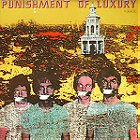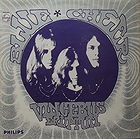Punishment Of Luxury formed around late 1976, initially for the “Mad Bongo Theatre Group” in Newcastle, England. Amongst the members of the early line-up that performed on John Peel’s show in 1978, were Brian Bond (vocals, keyboards), Neville Luxury (guitar, backing vocals), Malla Caballa (guitar), Jimi Giro (bass) and Jeff Thwaite (drums, percussion). The inspiration behind the moniker of the group came from Italian artist Giovanni Segantini‘s 1891 painting, The Punishment Of Luxury (which was originally known as “The Punishment Of Lust”, until it was purchased and retitled in 1893 by the Walker Art Gallery in Liverpool, England. The reason for the title change was allegedly because folks from this epoch thought that it was “too provocative”). According to Brian, the group originally “got together for musicals – One based on Orwell’s '1984', another for a nasty factory owner in Cumbria“. In 1978, the first single, Puppet Life, was released through the Small Wonder record label (which more acclaimed groups such as The Cure, Bauhaus and Crass also released material on). Steve Sekrit later replaced Thwaite on drums, while Caballa is also reported to have departed around this time. The newfound incarnation of Punishment Of Luxury released their first album, Laughing Academy, in 1979 through United Artists records.
This quartet plays an eccentric style of music that is like a cross between New Wave and artsy Punk Rock (with bits and chunks of Funk, Progressive and Hard Rock thrown in here and there. I feel somewhat compelled to also say Glam Rock, but that might not be very accurate). Punishment Of Luxury are often compared to the likes of XTC, Wire and Gang Of Four, and while that’s actually not too far off, I still think that they have their own sound. However, just like most musicians and bands, Punishment Of Luxury do have a wide and rich array of influences which include the likes of Sparks, Devo, Frank Zappa, Iggy Pop, David Bowie, Sex Pistols, Robert Fripp, 10CC, Roxy Music, George Formby, Todd Rundgren and Charles Trenet. Science-Fiction and “the idea of people trying to do something different being laughed at” are some of the concepts behind Laughing Academy (there also appears to be some themes of the political variety present here). The lyrics are quite humorous and abstract (they can probably be interpreted in a number of different ways), yet they are also serious, logical and intelligent at times. Some might argue that this album hasn’t aged exactly well, but it has a slick production of sorts, and the amalgamate of creative songwriting, competent musicianship and comedic yet smart lyrics all make for a winning combination. Despite that, the music could still prove to be somewhat of an “acquired taste”, as for some it might be a tad too quirky. For other individuals who tend to be more adventurous with their music, lots of potential sonic euphoria is to be experienced on Laughing Academy.
The first track is a re-recorded version of “Puppet Life”. This version is more polished, and in my opinion, definitely surpasses the original one from 1978 in terms of overall quality. As it commences, one hears a nervous man mildly hyperventilating, referencing someone or something, saying “here they come. They’ll never take me away. I won’t go to Room 16”. A stentorian, disembodied voice proceeds and says to him, “YOU WILL” (a cartoon-ish voice then exclaims, “you’re already there!“. Disarrayed gibberish follows soon after). Neville Luxury then propels the whole thing forward with his aggressive guitar. While it may appear that the protagonist in the song is suffering from a strong case of paranoia, he actually seems to find himself existing in some type of George Orwell-ian 1984 universe. Both the music and lyrics happen to give me visions of a carnival-esque, dystopian world. The lyrics in particular do make mention of feeling enslaved by a powerful authority (or a metaphorical “Big Brother”). Bassist Jimmy Giro once stated in a 2008 interview that “Puppet Life” was about “state oppression because that’s how people ruled“. Even after four decades, I think this song still remains highly relevant (especially in these current times where many humans all over the world don’t fully trust their governments, feel that their privacy is being invaded and natural-born rights diminishing with the passage of time).
"Wires stick through my soul, my actions are controlled
Turning me from free man to puppet life
Suspended in puppet life"
“Funk Me” turns out to be more fun and quirky (definitely much less anxious). Playful melodies introduce the tune along with jangly, Disco-fashioned rhythmic guitar and the pulsating, funky bass of Jimi. Brian and the gang make it more outrageous by making an assorted array of whimsical voices (I'm also fond of that cacophonous, discordant guitar solo that shows up around the 2:02 minute mark). With lyrics like “funk me ’til I’m crazy, sex is just a dream, I drink your gaze and dream of dust and cream“, I am not entirely sure what “Funk Me” alludes to (perhaps it's poking fun at the Disco subculture of the 1970s?). Punishment Of Luxury‘s fascination with Science-Fiction becomes apparent on “The Message”. Musically, this tune aligns itself more with Punk than Funk. The very anthemic “All White Jack” also rocks quite hard with a similar Punk-infused attitude, sporting a set of socially-aware lyrics as well. The keyboards heard during the short interlude in the middle add a slight touch of psychedelia. “Obsession” may be softer in tone, but it has a darker aura lingering around it, featuring flimsy, pseudo-symphonic synthesizers, which at times can sound a little creepy and others regal. This is the story of an insecure, introverted young man who is desperate for romance. He appears to obsessively admire one particular girl from a distance. Passionate feelings for her exist within his heart and mind, but he is hesitant to let her know of this for fear of being rejected and humiliated. Well, the outcome is quite grim: As daylight dies, he slips outside and proceeds to stalk the girl. He then abducts her, eventually becoming the one responsible for her murder. At the end, the killer frantically claims it was all just an accident, but simultaneously also remains in constant denial, believing that she is only sleeping (frustratingly demanding her to wake up).
"It only seems to happen with a corpse or a dream
Dead bodies don’t betray you
They never try to scream"
“Radar Bug / Metropolis” is primarily a New Wave track (with some Disco and Hard Rock weaved into it as well). Its bouncy beats and groovy rhythm are really contagious, in turn making the tune a very danceable one. The way that Brian sings here gives the impression that he may have inhaled a small quantity of helium at some point during the recording session. Punishment Of Luxury draws a nugget of inspiration from Devo in “British Baboon”, another straight-up wacky and funky tune. Brian resorts once more to those zany vocal histrionics here (monkey screeches and wolf howling? Get out!). “Babalon” tears a page from the Progressive Rock playbook. Starts rather slow with a set of staccato guitar riffs before rocketing off, presenting odd time-signature changes and some other creative arrangements. Great musicianship on everyone’s part here (especially Neville with his acrobatic guitar antics). The theme appears to be centered around religion and “The Whore Of Babylon” revelation.
"I saw a woman sit upon a scarlet-coloured beast
Full of names of blasphemy
And written on her forehead was 'Mystery'
Babalon the great
Mother of harlots and abominations of the earth"
“Excess Bleeding Heart” bursts out with much hyperactive energy, bearing an almost metallic sound. Finally, the title track arrives. Compared to the two previous tracks, “Laughing Academy” is lighter and more mellow with its poppy vocal harmonies. It's not necessarily the strongest song to finish the album with, but it's kind of a suitable one. Although Punishment Of Luxury was a highly creative, talented and unique group, things just didn’t ever really seemed to work out for them, unfortunately. Shortly after Laughing Academy, they released various enjoyable singles including "Secrets", "Brain Bomb" (what I would personally describe as a weird proto-Thrash/Speed Metal cut), "Baby Don't Jump" (which is basically Mike Patton-era Faith No More, only an entire decade before that), "Engine Of Excess" and "Jellyfish" (a wacky, aquatic tune that REALLY reminds me of SpongeBob SquarePants! Ha), all of which can be found again on the Dojo and Lemon reissues of the 1979 album. However, they were ultimately dropped by their record label (United Artists) when it was taken over by EMI (from there, they further drifted into obscurity). There also exists a rumor (which has been circulated on the internet for some time now) that a magazine by the name of Mojo once placed Laughing Academy in a list of “The 100 Worst Albums Of All-Time”. Did they now? Well, if that’s the case, then that is just amusing. While for most it may not necessarily be the greatest album ever recorded, it sure as heck isn't one of the absolute worst, either. If I were to ever compile a list of my top, personal favorite albums of all-time, you can bet that Laughing Academy would most certainly have a spot on it.
 Login
Login
 Home
Home 12 Reviews
12 Reviews Collections
Collections
 0 comments,
0 comments, 